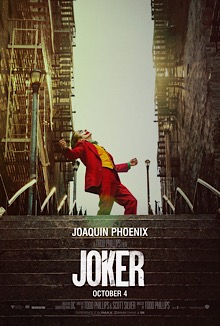
The cultural impact of this film has been like a wrecking ball, making waves among critics and pundits long before its release date. Fans have been hyping it up as one of the rare superhero-related films that has actual artistic merit while detractors have worried over whether it would inspire acts of terror in the real world. I waited for a while to make sure all of the buzz around it isn’t just the result of overenthusiastic marketing but there was little doubt that I would want to catch this one in the cinemas.
Arthur Fleck is a mentally disturbed man trying to get by as a clown in a Gotham city that is grappling with the usual crime and economic depression problems. He is attacked by young thugs, bullied at work, and abandoned by the city authorities due to budget cuts. He lives with his infirm mother who keeps insisting that her former employer billionaire Thomas Wayne would help them if he only knew of their plight. A colleague gives him a handgun for his own protection and he takes to carrying it around. One night in the subway, three drunken white-collar workers get rowdy and start beating him. He shoots two of them in a panic and when the third one flees, deliberately chases him down and kills him as well. Unexpectedly the downtrodden of the city hails the crime as a heroic act, saying that the rich deserve it for keeping them down. Meanwhile Arthur also takes note of single mother who lives in the same building as himself and seemingly begins a relationship with her.
As a piece of cinematic craftsmanship, this film is near perfect. The cinematography is excellent as the numerous meme-worthy still shots of the Joker in profile demonstrate. The choice of music aptly embodies the theme of the tragic clown. Though the film is set amidst the urban and moral decay of the 1980s, the music, lighting and palette often evokes an earlier era, recalling the atmosphere of Depression-hit America. Most impressive of all is of course the performance by Joaquin Phoenix. We’ve only recently watched him play a mentally ill person in You Were Never Really Here, yet here he is again embodying a completely different brand of crazy. Just from seeing his body which he has reworked to have an unsettling combination of being both muscular and yet undernourished you can tell how much effort he put into creating this character. As he moves he contorts his body in unnatural ways as he flits and dances across scenes in a display of showmanship that is both amateurish and yet convincingly earnest. Everything is perfectly calibrated by director Todd Phillips, surprisingly so given that nothing else in his filmography hints that he is capable of this level of quality.
More contentious is the debate over whether or not this film paints Joker as a heroic figure. Particularly interesting is how left-leaning critics have almost universally attacked it, prompted at least partly because Phillips has spoken out against Antifa and the far-left woke culture. There’s no doubt that the director takes great care to get the audience to sympathize with Arthur’s character and that he truly is mentally ill. He is the underdog who is constantly bullied by everyone and ground down by the system, so it’s easy for all of us to see a little bit of ourselves in him and imagine that we’re just one bad day away from snapping just as he did. Yet none of that makes what he does right and the violence he enacts is grossly disproportionate to the wrongs that he attributes to others. His interactions with his neighbor Sophie only makes it obvious how expertly our sympathy for him is controlled by the director. All it would take is a scene of him killing her onscreen to completely destroy any audience sympathy. Instead Sophie’s fate is left as a mystery, so we can continue cheering Arthur on as he goes on a murder spree.
While this film goes to some truly dark places and explores a tortured human psyche in a way that no comic book movie has ever done before, in many ways it is still a comic book movie. Arthur’s illness is a made up condition that has no grounding in reality. We are led to believe that he is too socially inept to properly talk to women yet is shrewd enough to deflect questioning by police officers. He is delusional enough to believe that his comedic act is actually funny but still wise enough to realize that Murray the talk show host only invited him to make fun of him. The depiction of Gotham lacks specificity and topicality. It throws in every trope of corruption and urban decay, so that like most comic book stories, it reaches for the universal and general rather than the real and so instead of authenticity it substitutes pure rage and passion. It’s the comic book approach to dramatize head on conflicts rather than reveal new insights.
This remains a very well made film and it’s always a good sign when art sparks discussion and debate. But I find it impossible to really like this film as I believe that there are no real philosophical values in it. It invites you to sympathize with a destructive and monstrous character, while showing that his path will lead only to the end of civilization as Tyler Cowen put it. It reminds me of the immensely successful but morally reprehensible The Purge franchise which pretty much every critic hated for good reason except that in this case Joker is actually well made. It does deserve to be watched but I would be cautious about holding it up as a great film.
One thought on “Joker (2019)”